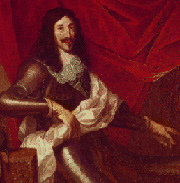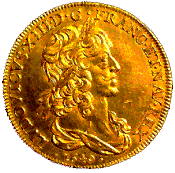![]()
Background
Henri IV (1589-1610), the grandfather of Louis XIV, had issued L'Edit de Nantes (1598) to bring an end to the French religious wars by providing French Protestants with certain rights, but his assassination in 1610 proved that unrest still continued. His nine-year-old son, Louis XIII (1610-43) inherited the throne, while the queen, Marie de Médicis (1573-1642), served as regent. Cardinal Armand Jean du Plessis de Richelieu (1585-1642), an unscrupulous, crafty figure who became premier ministre in 1624, soon superseded the power of the queen. Richelieu--credited with coining the term "raison d'état"--carried out a multi-pronged plan to make France the greatest power in Europe.
- Against the Huguenots
- 1628, captured La Rochelle (the last Huguenot fortress in France).
- 1629, issued the L'Edit de Grâce d'Alès which annulled Protestant political and military privileges.
- Against the French nobility
- prohibited duels.
- demolished fortified châteaus.
- appointed intendants to run the provinces.
- Against French neighbors (Thirty Years' War)
For Richelieu, and France, the Thirty Years' War (1618-48) proved to be of decisive importance. The War was actually a series of wars that began in May 1618 with the defenestration of Prague--Calvinist nobles in Prague tossed the representatives of the Holy Roman Emperor out the window.
The Treaty of Westphalia (1648) ended the war with a series of clauses:
- Religious
- Calvinism became a recognized Protestant faith along with Lutheranism.
- German princes could choose the religion of the inhabitants of their territory.
- Protestants could keep all lands seized from Catholics.
- Political
- Each German prince became a sovereign entity.
- Territorial
- France received Alsace, Metz, Toul, Verdun and part of Lorraine.
- Sweden received part of Pomerania, Bremen and Stettin.
- Switzerland and Holland were recognized as independent.
The treaty greatly weakened the Holy Roman Empire, delayed the unification of Germany, confirmed the decline of Spain and crowned the appearance of France as the newly-emerging, dominant power in Europe. In the midst of the war, Louis XIV was born and became king of France.
Books about Louis XIII
- A. Lloyd Moote. Louis XIII, the Just. Berkeley: University of California Press, 1989.
- James Collins. The State in Early Modern France. New York: Cambridge University Press, 1995.
- Sharon Kettering. Judicial Politics and Urban Revolt: The Parlement of Aix, 1629-1659. Princeton: Princeton University Press, 1978.
- Russell Major. From Renaissance Monarchy to Absolute Monarchy: French Kings, Nobles, and Estates. Baltimore, MD: Johns Hopkins University Press, 1994.
- Elizabeth Marvick. Louis XIII: The Making of a King. New Haven, CT: Yale University Press, 1986.
- Hester Chapman. Privileged Persons: Four Seventeenth-Century Studies. New York: Reynal, 1966.

- Victor Tapié. France in the Age of Louis XIII and Richelieu. Translated and edited by D. M. Lockie. Foreword and bibliography by R. J. Knecht. New York: Cambridge University Press, 1984 (1974).
- Armand Jean du Plessis duc de Richelieu. Testament politique de Richelieu. Edited by Françoise Hildesheimer. Paris: Société de l'Histoire de France, 1995.
- Armand Jean du Plessis duc de Richelieu. Mémoires du cardinal de Richelieu. Paris: Librairie Renouard, H. Laurens, 1908-31. 10 vols.
- Alexandre Dumas. Trois mousquetaires [The Three Musketeers]. Paris, 1844 (Many English editions).
Web Resources about Louis XIII (There is not much.)
- For Louis XIII, there is some short information available, and, of course, there is Wikipedia, which also has his family tree.
- Most of the online information about him is in the various online encyclopedias.
- For Richelieu, excerpts from his political testament are online; a Triple Portrait of Richelieu by Philippe de Champaige in the National Gallery, London
- Alexandre Dumas, Two Centuries of Living Literature is a website devoted to Dumas, the author of The Three Musketeers. Also check the Dumas home page which maintains a very large number of of links and the history and analysis of the Three Musketeers.
